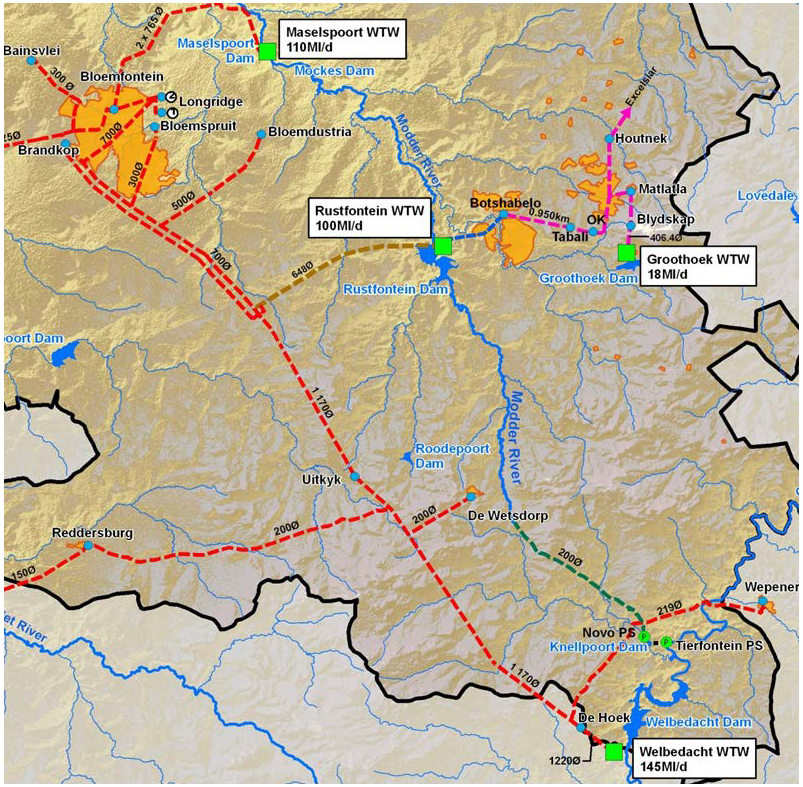|
Area of supply
The Greater Bloemfontein supply system provides the majority of potable water
requirements to the larger centres of Bloemfontein, Thaba Nchu and Botshabelo,
as well as the smaller towns of Wepener, Dewetsdorp, Reddersburg, Edenburg, and
Excelsior, which are also dependent to varying degrees on local water sources.
Currently approximately 66% of the treated water is supplied by Bloem Water,
primarily through Welbedacht and Rustfontein Water Treatment Plant (WTP) and the
balance via Mangaung Metropolitan Municipality’s Maselspoort WTP. A schematic
layout of the Greater Bloemfontein Supply System is shown in the figure below.

Planning for the Greater Bloemfontein Supply System
The Water Reconciliation Strategy Study for the Greater Bloemfontein Area was
undertaken by the Department of Water and Sanitation (DWS), in cooperation with
Bloem Water (BW), the Mangaung Metropolitan Municipality (MMM) and other
stakeholders in order to secure a sustainable future water supply for MMM and
the other Water Service Authorities served by Bloem Water’s regional water
supply schemes. The Reconciliation Strategy Study was completed in June 2012. A
core element of the recommendations presented in this Strategy is Integrated
Water Resource Management. Some of the recommendations that are presented in
this Strategy are challenging, but they comprise practical and logical next
steps to ensure sustainable and improved future management of the BW schemes and
local sources of water supply, including the selection of interventions to
balance supply and requirements. New approaches are needed to plan and supply
urban water needs, including altered consumer behaviour and appreciation of the
scarcity of water, and the development and funding of more diversified
portfolios of integrated new and alternate water sources and the use of surface
and groundwater systems to sustainable levels of abstraction.
The purpose of the Reconciliation Strategy is to determine the current water
balance situation and to develop various possible future water balance scenarios
up to 2035 and beyond. The Reconciliation Strategy provides a framework for
decision making with associated actions, responsibilities and timing of such
actions that are urgently needed to reconcile the supply and requirement.
Strategy Steering Committee
One of the recommendations which came out of the Strategy Study was that a
Strategy Steering Committee be formed with a clearly defined mandate and scope
of work. The primary function of the Strategy Steering Committee will be to
ensure the implementation of the strategy and to make recommendations, on an
annual basis, on long-term planning activities required to ensure on-going
reconciliation of requirement and available supply in the Greater Bloemfontein
area.
A Strategy Steering Committee was formed in November 2011. This Committee has
representatives from DWS regional and national offices, Mangaung Metropolitan
Municipality, Bloem Water, organized agriculture, relevant District and Local
Municipalities, the Department of Economic Development, Tourism and
Environmental Affairs, the Bloemfontein Chamber of Commerce and Industry, and
SALGA. The Strategy Steering Committee actively monitors implementation of the
strategy by all role-players. The Strategy Steering Committee will update the
strategy annually as additional information becomes available. Organisations
represented on the Strategy Steering Committee must ensure that recommendations
made in the Strategy document are implemented and assume a collective
responsibility for ensuring the on-going reconciliation of supply and
requirement.
The objectives of the Strategy Steering Committee are:
To ensure implementation of the recommendations of the Reconciliation Strategy. To update the Strategy to ensure that it is relevant. To ensure that the Strategy and its recommendations are appropriately
communicated.
|